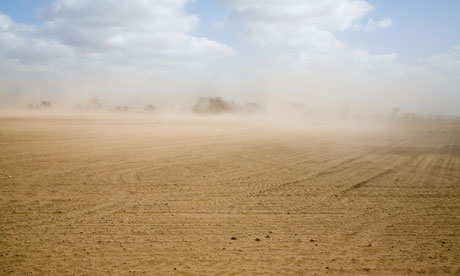A new report says that the world will need to more than double food production over the next 40 years to feed an expanding global population. But as the world's food needs are rapidly increasing, the planet's capacity to produce food confronts increasing constraints from overlapping crises that, if left unchecked, could lead to billions facing hunger.
The UN projects that global population will grow from today's 7 billion to 9.3 billion by mid-century. According to the report released last week by the World Resources Institute (WRI), "available worldwide food calories will need to increase by about 60 percent from 2006 levels" to ensure an adequate diet for this larger population. At current rates of food loss and waste, by 2050 the gap between average daily dietary requirements and available food would approximate "more than 900 calories (kcal) per person per day."
The report identifies a complex, interconnected web of environmental factors at the root of this challenge - many of them generated by industrial agriculture itself. About 24% of greenhouse gas emissions come from agriculture, encompassing methane from livestock, nitrous oxide from fertilisers, carbon dioxide from onsite machinery and fertiliser production, and land use change.
Industrial agriculture, the report finds, is a major contributor to climate change which, in turn is triggering more intense "heat waves, flooding and shifting precipitation patterns", with "adverse consequences for global crop yields."
Indeed, global agriculture is heavily water intensive, accounting for 70 per cent of all freshwater use. The nutrient run off from farm fields can create "dead zones" and "degrade coastal waters around the world", and as climate change contributes to increased water stress in crop-growing regions, food production will suffer further.
Other related factors will also kick in, warns the report: deforestation from regional drying and warming, the effect of rising sea levels on cropland productivity in coastal regions, and growing water demand from larger populations.
Yet the report points out that a fundamental problem is the impact of human activities on the land itself, estimating that:
"... land degradation affects approximately 20% of the world's cultivated areas".
Over the past 40 years, about 2 billion hectares of soil - equivalent to 15% of the Earth's land area (an area larger than the United States and Mexico combined) - have been degraded through human activities, and about 30% of the world's cropland have become unproductive. But it takes on average a whole century just to generate a single millimetre of topsoil lost to erosion.
Soil is therefore, effectively, a non-renewable but rapidly depleting resource.
We are running out of time. Within just 12 years, the report says, conservative estimates suggest that high water stress will afflict all the main food basket regions in North and South America, west and east Africa, central Europe and Russia, as well as the Middle East, south and south-east Asia.
Unfortunately, though, the report overlooks another critical factor - the inextricable link between oil and food. Over the last decade, food and fuel prices have been heavily correlated. This is no accident.
Last week, a new World Bank report examining five different food commodities - corn, wheat, rice, soybean, and palm oil - confirmed that oil prices are the biggest contributor to rising food prices. The report, based on a logarithm designed to determine the impact of any given factor through regression analysis, concluded that oil prices were even more significant than the ratio of available world food stocks relative to consumption levels, or commodity speculation. The Bank thus recommends controlling oil price movements as a key to tempering food price inflation.

You need to be a member of 12160 Social Network to add comments!
Join 12160 Social Network